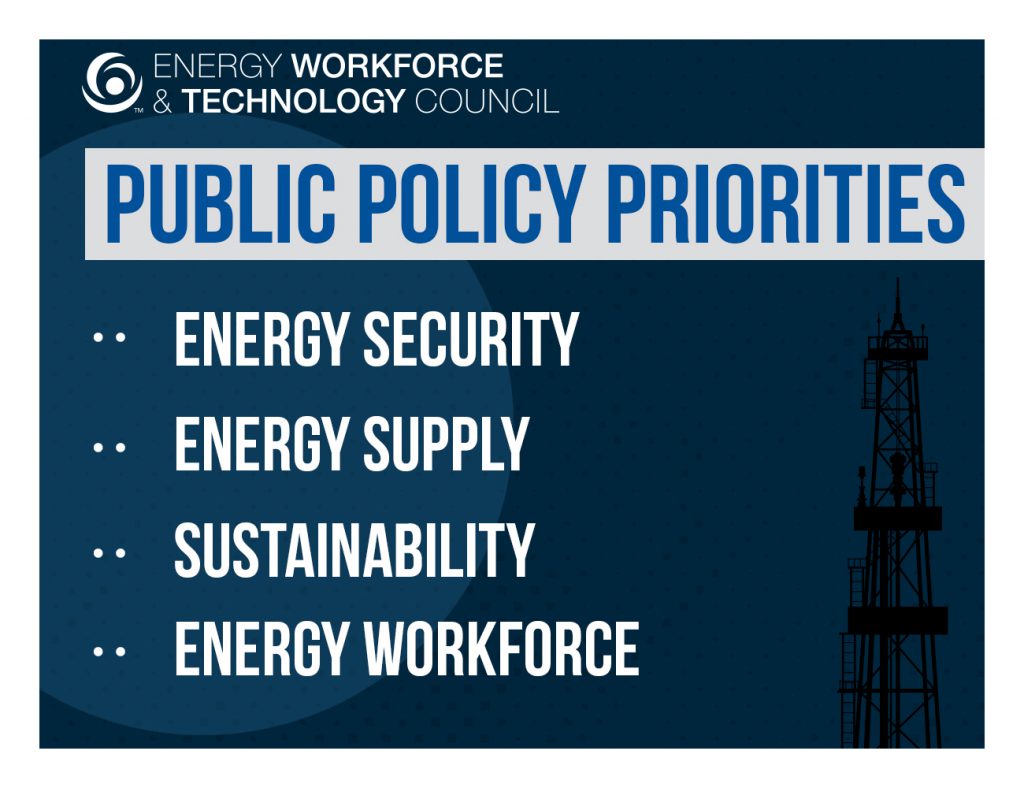Energy Workforce & Technology Council held its annual Washington, DC Fly-In this week with 50 executives from Member Companies traveling to the nation’s capital to meet with Congressional and Biden Administration officials. In coordination with the Fly-In, Energy Workforce released its 2023 policy priorities, including:
- energy security
- energy supply
- sustainability
- international market access
- energy workforce
“As our representatives met with Congressional leaders from across the country and Administration officials, we sought cooperation on issues that allow for our industry to provide affordable, reliable energy through new, emission reducing technologies. For the national, economic and energy security of the United States, policy makers must adopt an ‘all of the above’ energy strategy that promotes domestic energy production, emissions reducing technologies and resources, an expansion of renewable energy, and doesn’t seek to eliminate an entire industry.”
Leslie Beyer, CEO, Energy Workforce & Technology Council
“Our nation’s leaders should invest in energy infrastructure, make federal lands and waters accessible to exploration and production, provide support for all energy technology that reduces emissions, and stop the vilification of the oil and gas industry as we seek to recruit and retain the energy workforce needed to meet ever growing demand,” Beyer said.
“Energy Workforce will continue to push our national and state officials and regulators to protect our domestic energy resources and encourage further investments in production and infrastructure.”
The Energy Workforce policy priorities call for
- Energy security by providing reliable, affordable and accessible energy
- Energy supply by ensuring access to federal lands and water for energy exploration and production
- International market access for energy resources and continuing to allow oil and gas exports
- Sustainability through technology development, and emissions reducing innovations and technologies
- Energy workforce development to support recruitment and retention, promoting diversity, equity and inclusion in the energy workforce, and providing upskilling opportunities, all in the effort to provide long-term industry stability.
More specifically, Energy Workforce is calling on policy makers to pass comprehensive permitting reform including reducing timelines for building critical energy infrastructure by streamlining application processes and expediting approvals.
Additionally, Energy Workforce supports reforms to the National Environmental Policy Act (NEPA), and the “One Federal Decision” framework for energy projects, and litigation reform. While Energy Workforce recognizes the benefits of 45Q incentives, without significant permitting reform at the same time, the impact of these incentives will be muted.
Energy security is imperative for the U.S. and allies. Energy Workforce believes that U.S. natural gas is a significant asset, and domestic natural gas production should be encouraged to bolster the reliability and affordability of energy. Also, exporting U.S. LNG abroad strengthens the U.S. economy, the energy workforce and the national security of the United States and allies.
Energy Workforce Member Companies are also in the forefront of reducing emissions across the energy services sector. Members support safely cutting GHG emissions by developing and implementing low carbon energy sources and technologies as incentivizing production and deployment of emission reducing technology is an effective strategy to curb overall U.S. emissions.
Additionally, Energy Workforce opposes efforts to require companies who contract with the U.S. government to submit ESG disclosers. New metrics and ESG disclosures should not be a government-led activity, rather it needs to be a public private partnership to assure goals and expectations are real, achievable, and predictable, and the collected data is only used to improve climate change outcomes, and not as a discouragement to invest in hydrocarbon production.
International trade is critical to the success of the domestic energy industry by fostering fair cooperation, retention of dispute settlement mechanisms and robust intellectual property protections. Energy Workforce supports a balanced approach to trade and tariffs that address illicit practices and considers economic implications for U.S. businesses that contribute to the overall American economy, create jobs, and support communities across the nation.
A thriving energy workforce and access to skilled labor is also essential for the future of the industry and the nation’s energy security. The sector continues to add jobs and is approaching pre-pandemic employment numbers. But more can be done to help in recruiting and retaining talent. The energy industry, including the oil field services sector, offers good paying career opportunities. To assist in raising the employment level across the energy industry, Energy Workforce calls on national leaders to support expanding STEM education and other programs that encourage work in the industry instead of continuing a narrative of vilification of oil and gas, leading to a negative public perception.
For more information about Energy Workforce’s policy priorities, contact President Tim Tarpley.
Corry Schiermeyer, Senior Director Communications, writes about governmental policies for the Energy Workforce & Technology Council. Click here to subscribe to the Energy Workforce newsletter, which highlights sector-specific issues, best practices, activities and more.





